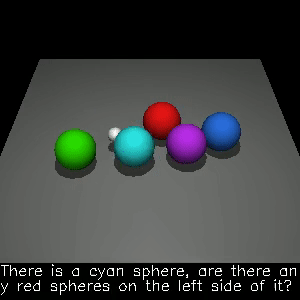PyTorch implementation of Language as an Abstraction for Hierarchical Deep Reinforcement Learning.
This paper uses language as the abstraction for Hierarchical Reinforcement Learning. Using this approach, agents can learn to
solve to diverse, temporally-extended tasks such as object sorting and multi-object rearrangement.
The proposed architecture has a 2-layer hierarchical policy with compositional language as the abstraction between the high-level policy and the low-level policy. This repository aims to replicate the results for low-level policy experiments (Figure 4 in the paper).
The experiments include state-observations and raw-pixel observations. This repository only focuses on the state-based representation (Figure 7 in the paper).
 |
|---|
| The environment and some instructions considered in this work |
 |
|---|
| Low-level policy trying to complete randomly sampled goals |
The paper uses the CLEVR-Robot environment which is built on top of the MuJoCo physics simulator. These libraries are required. PyTorch 1.3 is used.
Simply running the main.py file starts the training.
Future Instruction Relabeling Strategy (Algorithm 4 in the paper) and the Computation graph of the state-based low level policy (Figure 7 in the paper) can be found in util.py
DQN, Instruction Encoder and the f1 network can be found in networks.py
 |
|---|
| Agent completing an instruction |
 |
|---|
| The part showed by the red box is implemented in this repository. The instructions are sampled randomly from the environment. |
- Yiding Jiang, Shixiang Gu, Kevin Murphy, and Chelsea Finn. Language as an Abstraction for Hierarchical Deep Reinforcement Learning. In Workshop on “Structure & Priors in Reinforcement Learning”at ICLR 2019, jun 2019. URL http://arxiv.org/abs/1906.07343.